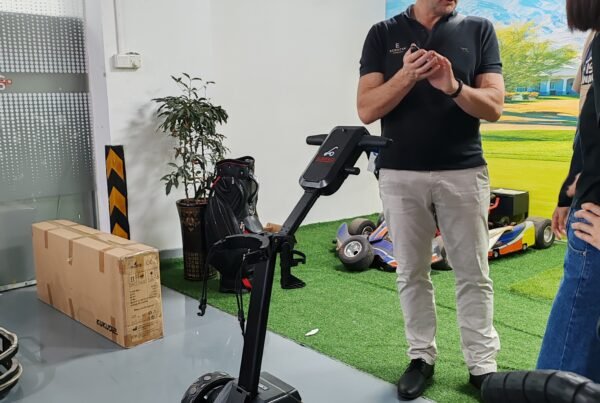
If you’re shopping for an electric golf trolley, battery safety is likely a top concern. Lithium batteries power most modern trolleys, but are they safe?
The short answer: Yes, when used correctly.
Why Lithium Batteries Are the Go-To Choice
Lithium-ion (Li-ion) batteries dominate the market because they:
- Last longer(500+ charge cycles vs. 200-300 for lead-acid).
- Weigh less(50-70% lighter than traditional batteries).
- Charge faster(3-5 hours vs. 8-12 for lead-acid).
About the safety, we can learn more. Here’s what you need to know.
Key Safety Features of Lithium Golf Trolley Batteries
Reputable brands integrate multiple safety mechanisms:
1. Built-in Battery Management System (BMS)
The BMS is the brain of your battery. It:
- Prevents overcharging.
- Blocks short circuits.
- Balances cell voltage.
- Stops overheating.
Without a BMS, lithium batteries risk swelling or even catching fire. Always buy from trusted brands (e.g., Motocaddy, Nerch G5) that prioritize BMS protection.
2. Thermal Protection
High-quality lithium batteries include:
- Temperature sensors.
- Automatic shutdown in extreme heat/cold.
Golfers in hot climates benefit greatly from this feature.
3. Durable, Shock-Resistant Design
Golf trolleys face bumps and vibrations. Good lithium batteries use:
- Rugged outer casings.
- Shock-absorbing materials.
Cheap, no-name batteries often skip these safeguards—avoid them.
Why Every Golf Cart & Trolley Needs a Smart BMS
A Built-in Battery Management System (BMS) is the unsung hero of modern golf cart batteries and golf trolley power systems. Without it, even premium lithium batteries can become safety hazards.
How a BMS Protects Your Golf Equipment
- Overcharge prevention– The BMS cuts off power when full, extending battery life. Research from Battery University shows proper charging can double lithium battery lifespan.
- Short circuit protection– Vital for golf carts that face constant vibration on the course.
- Cell balancing– Ensures all cells in your golf caddy battery discharge evenly.
- Thermal regulation– Automatically reduces power if temperatures rise dangerously.
The U.S. Consumer Product Safety Commission reports over 25,000 lithium battery incidents annually – most from uncertified batteries lacking proper BMS protection.
Trusted Brands for Golf Trolley Batteries
Not all BMS systems are equal. Top brands invest in advanced protection:
- Motocaddybatteries feature
- Nerch G5uses military-grade circuit protection
Choosing Safe Golf Cart Batteries
- Look for UL1973or IEC62133 certifications
- Check for at least 3-layer BMS protection
- Avoid suspiciously cheap golf cart batteries– they often skip safety features
Pro Tip: For visual learners, this BMS comparison chart shows how quality systems differ.
Maintenance Matters
Even the best golf trolley battery needs care:
- Store between 50-80°F when not in use
- Use only manufacturer-approved chargers
- Inspect monthly for swelling or damage
With proper BMS protection and maintenance, your golf caddy battery will deliver years of safe, reliable performance.
Are There Any Risks?
Lithium batteries are generally safe, but problems arise from:
- Poor-quality batteries(no BMS, weak casing).
- Physical damage(punctures, extreme impacts).
- Improper storage(leaving in a hot car).
Follow manufacturer guidelines, and risks drop to near zero.
Are Golf Trolley Lithium Batteries in Golf Carts Really Safe?
Lithium batteries power most modern electric golf push carts with follow mode and remote-controlled golf carts, but are they completely risk-free? While generally safe, potential hazards exist when safety measures are ignored.
Common Risk Factors for Golf Cart Batteries
Low-Quality Batteries
- Cheap battery-powered golf cartsoften skip essential safety features like BMS (Battery Management Systems).
- According to a CPSC report, uncertified lithium batteries have higher failure rates.
Physical Damage
- Punctures or extreme impacts can cause thermal runaway in self-propelled golf bag carts.
- A study by UL Solutionsshows damaged lithium batteries are 5x more likely to overheat.
Improper Storage & Charging
- Leaving a golf remote control cartbattery in a hot car degrades performance.
- Battery Universityrecommends storing lithium batteries at 50%-80% charge in cool, dry places.
How to Minimize Risks in Electric Golf Carts
✔ Buy Certified Batteries – Look for UL/IEC marks on remote-controlled golf carts.
✔ Avoid Extreme Conditions – Don’t expose electric push carts to temperatures above 140°F (60°C).
✔ Use OEM Chargers – Mismatched chargers can overheat self-propelled golf trolleys.
Why Smart Golfers Choose Reliable Brands
Top-tier electric golf push carts with follow mode (like Motocaddy and Garmin Approach) use:
- Military-grade BMS protection
- Shock-resistant battery casings
- Temperature sensors
Pro Tip: Check this safety comparison guide before buying a remote golf cart battery.
With proper care, lithium batteries in golf remote control carts are extremely safe. Stick to reputable brands and maintenance tips, and risks become negligible.
Expert-Backed Safety Tips
| Safety Tip | Key Action | Why It Matters |
| Buy from Reputable Brands | Look for CE/UL certifications | Certified brands (like Motocaddy) use proper BMS protection to prevent fires |
| Use the Correct Charger | Only use manufacturer-approved chargers | Mismatched chargers overheat batteries – UL study shows this causes 23% of failures |
| Proper Storage | Keep in cool, dry place (20-25°C) | High temps degrade batteries – Battery University recommends <30°C storage |
| Regular Inspection | Check monthly for swelling/leaks | Early damage detection prevents catastrophic failures in golf carts |
Final Verdict: Safe with Smart Choices
Lithium golf trolley batteries are safe, efficient, and reliable—if you choose a quality product and handle it responsibly.







